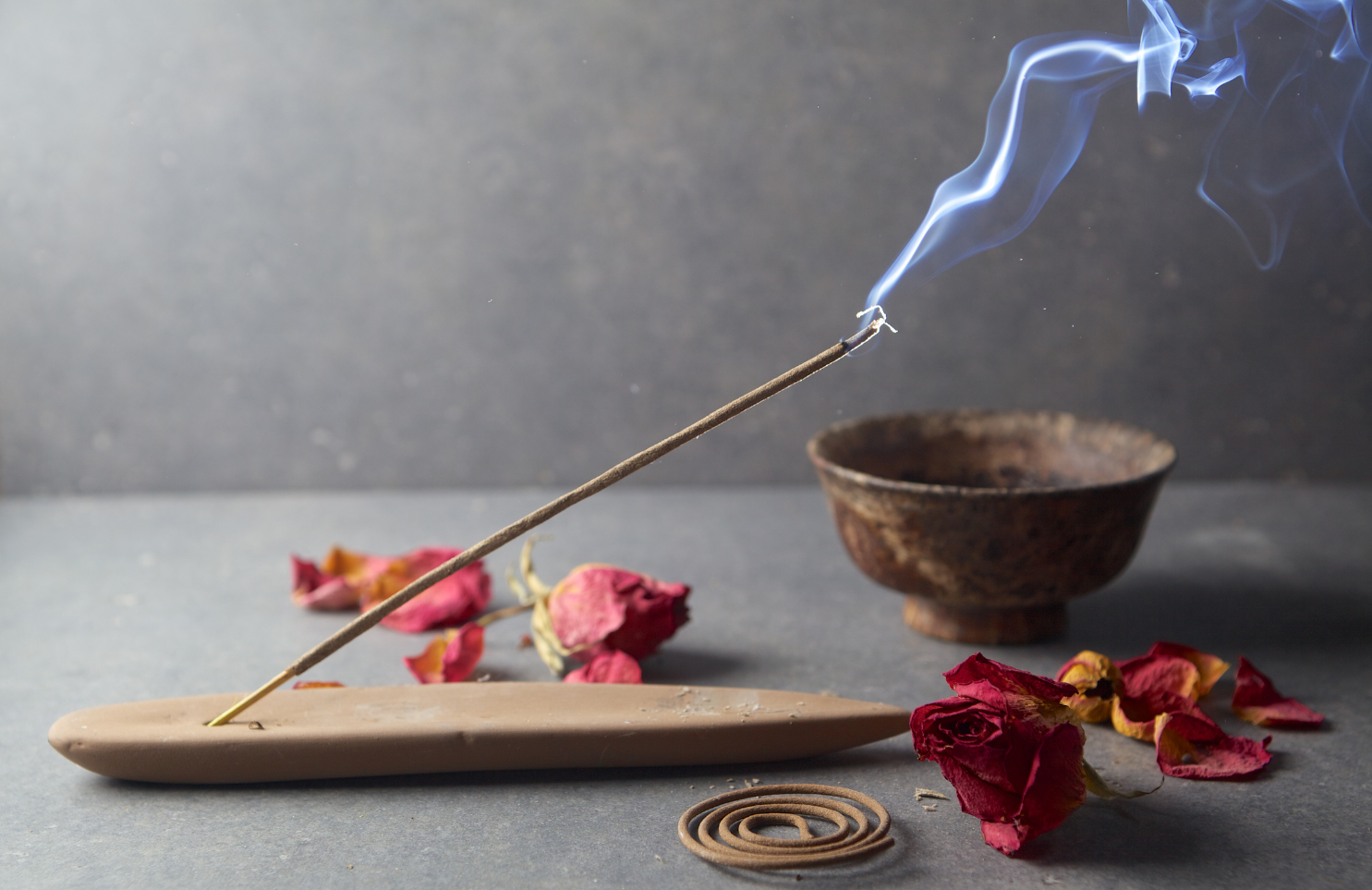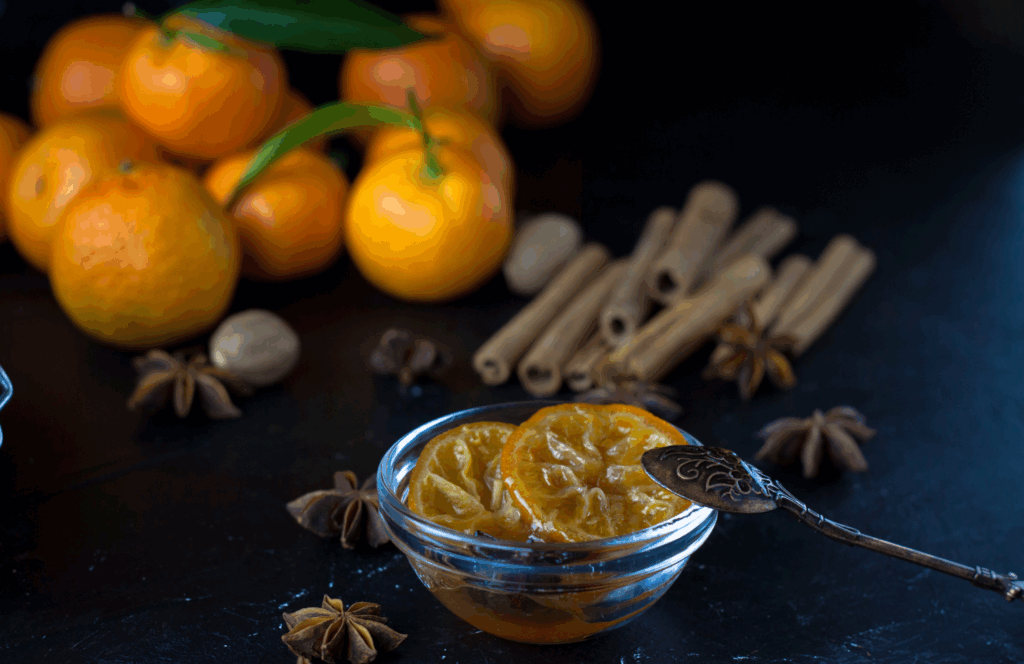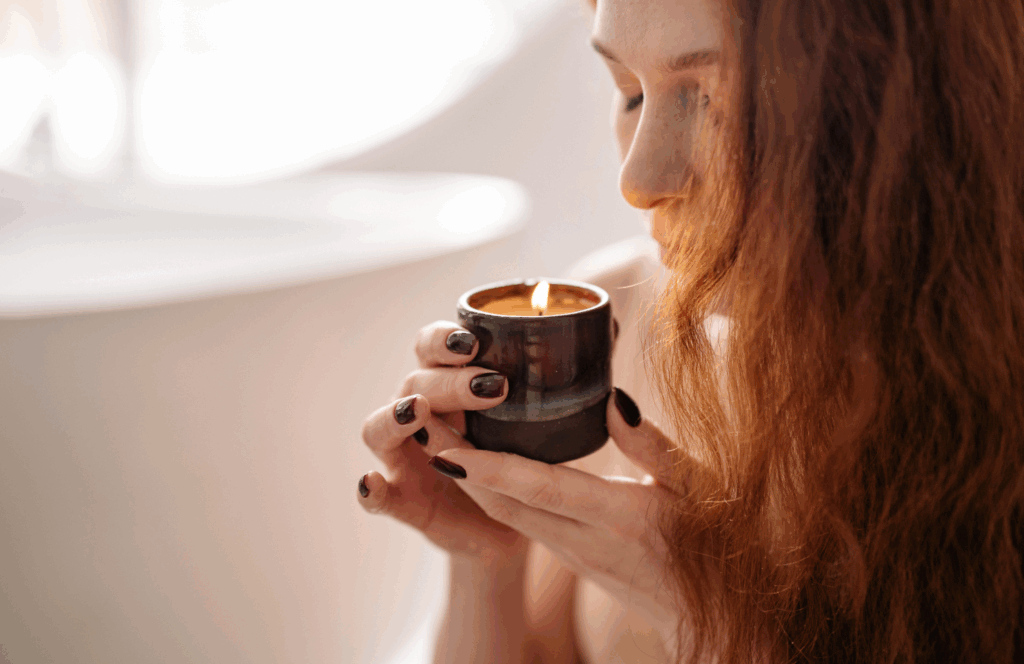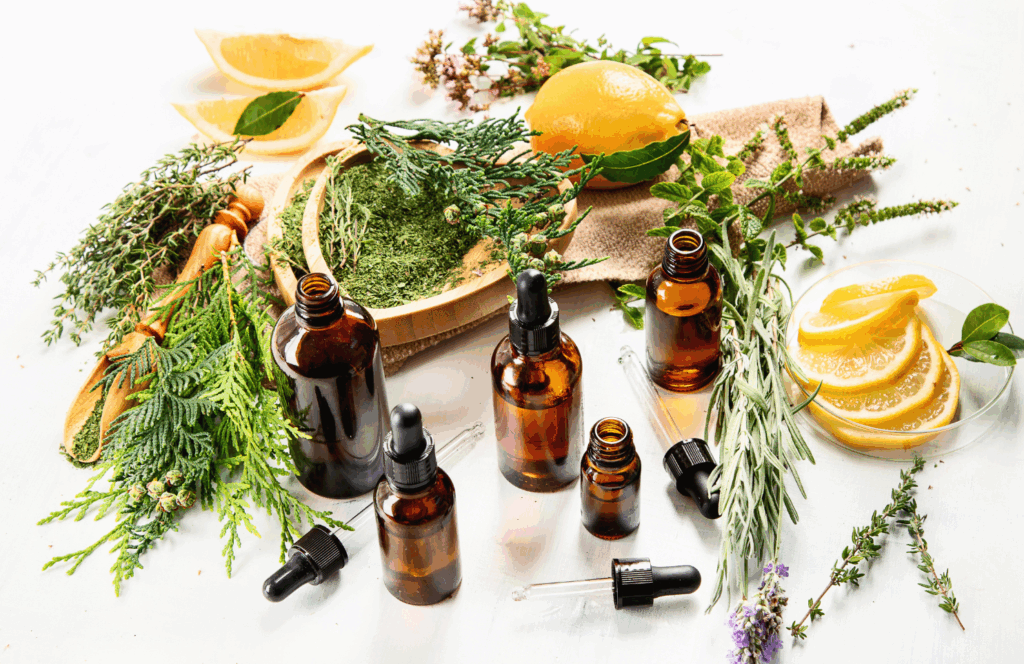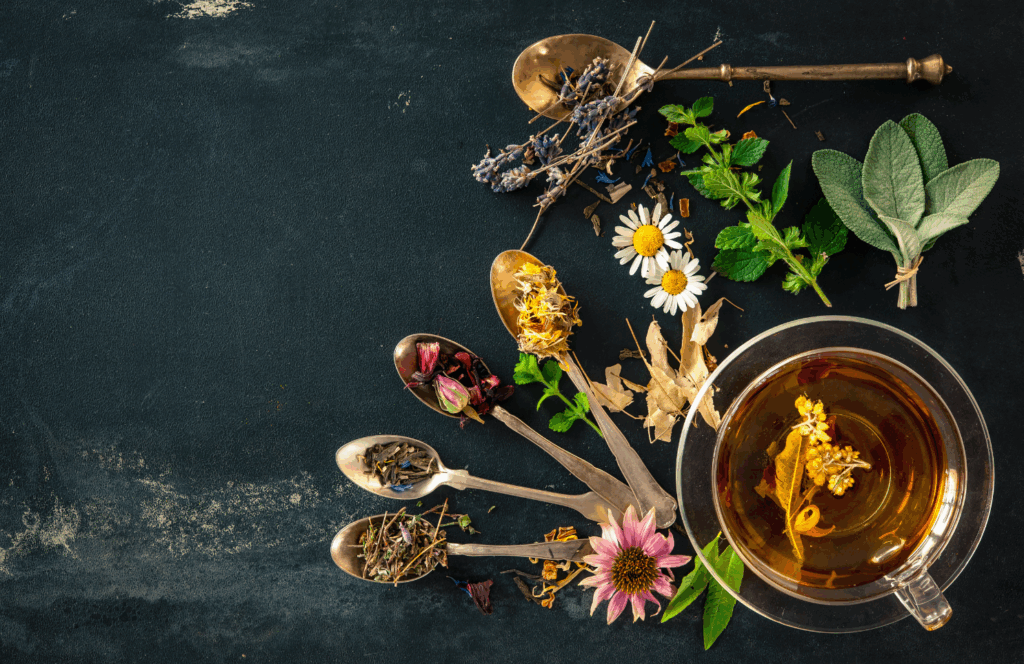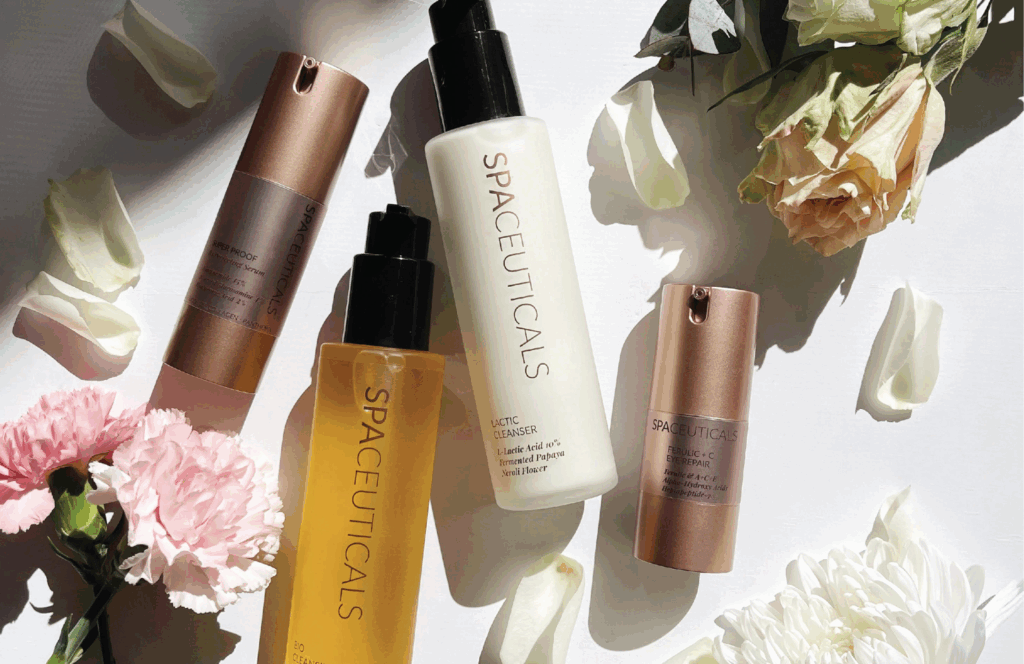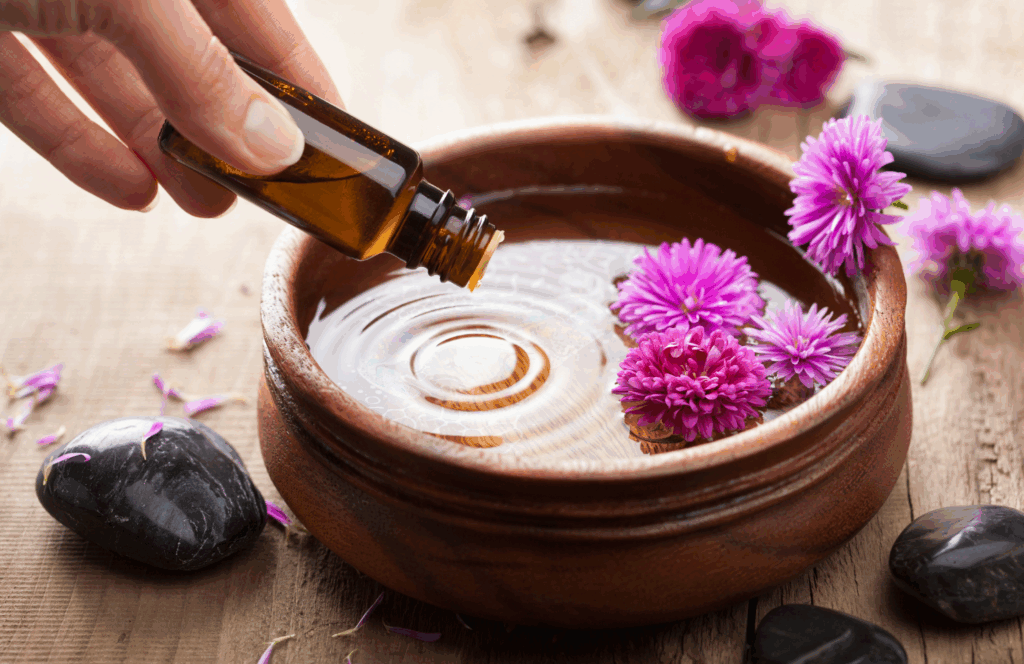What Are the Benefits of Aromatherapy? Michelle Reeve from Waterlily takes us on a sensory journey sharing how scent supports wellbeing, in her love letter to aromatherapy.
Well, here we are again. Aromatherapy Awareness Week! It’s like Christmas for people like me who like to nerd out about molecules floating through the air and doing magical things to our brains. I know.. (sigh)…maybe I need to get out more, but please stay with me.
This morning, while scouting for unlabelled snacks in our Waterlily team kitchen, I caught a whiff of the bergamot in the Earl Grey cannister next to the fridge. Immediately it activated one of those delicious “aha!” moments.
Here I was, literally inhaling volatile organic compounds that were about to bypass my (mostly) rational brain and head straight for my emotional control centre, the limbic system (which is like having a VIP pass to the most exclusive theme park in your head). This is the part of the brain where memories, emotions, and arousal all hang out together having the time of their lives.
And that good people, is when it hit me: we’re all walking around with this incredible superpower, this direct hotline to our deepest self, and most of us are completely and utterly oblivious to it. We’re like Clark Kent (the not-so-subtle Reeve double!), but instead of X-ray vision, we have ‘scent-ray’ vision (you’re welcome) and we’re just too busy with our head down, doom scrolling to notice we can literally smell our way to better health, happiness, and dare I say, even younger-looking skin.
“We can literally smell our way to better health, happiness, and dare I say, even younger-looking skin!”
The Benefits of Aromatherapy for Unlocking Memories
Let’s talk about something that continues to blow my mind. Your nose is basically a time machine. Not the 1980’s DeLorean kind (although that could be kinda cool), but something far more elegant and mysterious. When you smell something, let’s say vanilla, those molecules don’t graciously knock on the door of your brain and wait for permission to enter. Nope, they’re much more brazen than that.
They waltz right past your logical, sensible frontal cortex (the part that pays bills and remembers to buy milk) and head straight for your olfactory bulb, which is practically snuggled up to your hippocampus and amygdala. This is HQ for your memory and emotions. Smell is the only sense that gets this VIP style treatment. Every other sense must first check in with the bouncer (that’s your thalamus)… but smell? Smell has some serious VIP red carpet connections.
This is why you can walk into a bakery and suddenly you’re seven years old again, standing in your grandmother’s kitchen, feeling completely safe and loved! It’s not nostalgia. Nuh huh, it’s neuroscience. And it’s happening whether you’re paying attention or not. A concept which I find both tantalising and slightly terrifying at the same time.
“It’s not nostalgia. Nuh huh, it’s neuroscience”
I remember reading about a study where they exposed people to different scents while they were learning, and then again during testing. The people who smelled the same scent during both sessions performed significantly better. Basically, their noses were taking notes! I immediately started wondering… What if we’ve been approaching education all wrong? What if instead of highlighters, students should be armed with essential oil inhalers? The Hogwarts of Aromatherapy College!
The Invisible Language We All Speak
But, here’s where it gets really interesting, and just a little bit cheeky. We like to think we’re so evolved, so sophisticated, so above our animal instincts (…hang on there a moment Rob… well nearly everybody!). But the truth is, we’re constantly having conversations with each other through scent, and most of us don’t even realise. We’re like beagles at a very fancy dinner party, trying to pretend we’re not sniffing each other, but so absolutely sniffing each other.
“.. we are constantly having conversations with each other through scent, and most of us don’t even realise”
Mother Nature, in her infinite wisdom (and possibly her own amusement), gave us this incredible communication system. Pheromones are real, people! Not just for attracting mates (though there’s that too.. a whole other podcast!) but for bonding, for comfort, for creating that inexplicable sense of “home” when you hug someone you love. It is lit-er-ally chemistry happening right under our noses. The irony is almost too perfect.
Plants figured this stuff out eons ago. When a tree is under attack from insects, it doesn’t just suffer in silence like a stoic Brit, it sends out a chemical SOS through the air to warn other trees, who then start producing their own defence compounds. They’re essentially having a group Whatsapp chat through aromatic molecules. “Heads up, everyone! Aphids incoooomiiinnng!” And here we are, thinking we invented social media. Oh my!
The Retail Therapy That Actually Works
Speaking of communication, let’s talk about something near and dear to my heart: retail therapy. Now, before you roll your eyes, I’m not talking about mindlessly buying things because you had a bad day (though no judgement here!). I’m talking about the very real, scientifically backed therapy that happens when you engage your senses intentionally.
There’s legitimate research showing that certain scents can reduce cortisol levels (that’s your stress hormone) the one that makes you want to hide under a blanket and inhale ice-cream directly from the container (totally legit btw). Lavender, for instance, doesn’t just smell nice; it actually tells your nervous system to chill out. It’s like having a therapist in your pocket, except that this therapist works immediately, doesn’t ask you how YOU feel, and also doesn’t charge by the hour.
“It actually tells your nervous system to chill out…It’s like having a therapist in your pocket”
But here’s the thing… we’re not just passive recipients of these aromatic messages, we can be intentional about it. We can curate our scent environment the same way we curate our Spotify playlist or our Instagram feed. We can choose to surround ourselves with molecules that support how we want to feel, how we want to think, how we want to move through the world.
“We’re composing a masterpiece of molecules!”
This is where the magic of formulation together. When we’re creating a product at Waterlily, we’re not just mixing nice smells together and hoping for the best. We’re composing a masterpiece of molecules, each one chosen for its specific therapeutic properties, its emotional resonance, and its ability to work in harmony with your skin and your psyche. Something that perfumes simply can’t do.
The Science of Scent and Memory
Let me share something that happened to me last week that perfectly illustrates why I’m so passionate about this work. I was in the our Botanical Laboratory, testing a new blend, when I caught a note of cinnamon mixed with tangerine peel. Suddenly, I was transported to Christmas morning when I was nine, sitting by the tree in my pajamas, everything perfect and possible.
And it wasn’t just the memory that came flooding back. It was the feeling. The sense of wonder, of anticipation, of being completely present in that moment. That’s not just nostalgia; that’s the power of scent to literally change your neurochemistry. Neurochemistry governs our autonomic nervous system… think the subconscious systems that happen without thinking blood flow, immunity, digestion and fertility. All impacted by the state of neurochemistry.
“The power of scent to literally changes your neurochemistry”
The research on this is absolutely fascinating. Studies have shown that people with Alzheimer’s disease, who may have lost the ability to recognise faces or remember names, can still be reached through familiar scents. Lavender from a childhood garden, the scent their partner wore, the smell of their mother’s cooking. These aromatic memories can cut through the fog when nothing else can.
I think about this every time I’m formulating a new product. What memories am I helping to create? What feelings am I supporting? What moments of joy, of calm, of confidence am I helping to cultivate? It’s both humbling and incredibly exciting to think that the work we do here might become part of someone’s most cherished sensory memory or feel good moment.
Natural Remedies and the Everyday Benefits of Aromatherapy at Home
Here’s something that might blow your skirt up… that herb garden on your windowsill? That’s not just garnish for your Instagram-worthy 3 ingredient pasta dish. That’s a legitimate pharmacy that’s been in operation for thousands of years, long before we figured out how to synthesise anything in a lab.
“That windowsill herb garden is a legitimate pharmacy that’s been in operation for thousands of years”
Peppermint doesn’t just make your mojito taste better, it’s a natural analgesic and decongestant. That’s why your grandmother told you to breathe over a bowl of hot water with mint when you had a cold. She might not have known the science, but she knew it worked.
Rosemary isn’t just for roasting potatoes (though it does do something magical to them!). It’s been shown to improve memory and cognitive function. Shakespeare was onto something when he had Ophelia say, “There’s rosemary, that’s for remembrance.” The ancient Greeks used to wear rosemary garlands while studying. They were literally aromatherapy pioneers, and they didn’t even have Instagram to document it.
And eucalyptus? That wasn’t just randomly chosen for cough drops. It’s a natural antimicrobial and expectorant. Koalas might be onto something more profound than we thought. They’re basically living in a natural aromatherapy spa, high up in the trees, breathing in medicinal compounds all day. No wonder they look so zen.
The Skin-Brain Connection
Now, let’s talk about something that’s particularly close to my heart as a formulator: the connection between aromatherapy and skin health. Your skin isn’t just a pretty wrapper for your insides. It’s your largest organ, and it’s in constant communication with your brain.
When you’re stressed, your skin knows it. Cortisol doesn’t just make you feel frazzled; it breaks down collagen, triggers inflammation, and disrupts your skin’s natural barrier function. It’s like your face is keeping a stress diary, whether you want it to or not. Haunting!
“Cortisol breaks down collagen, triggers inflammation, and disrupts your skin’s natural barrier function”
But here’s the beautiful thing: when your skin ritual incorporates genuine aromatherapy principles, you’re not just treating your skin topically. You’re also treating your stress levels, your mood, your overall sense of wellbeing. Every time you apply that serum or treatment creme, you’re getting a little hit of therapeutic aromatherapy along with your active botanical, nutraceutical and cosmeceutical ingredients.
“…you’re getting a little hit of therapeutic aromatherapy along with active botanical ingredients”
This is why I’m so passionate about our formulations at Waterlily. We’re not just throwing in essential oils because they smell pretty (though they really do!). We’re carefully curating each aromatic component for its therapeutic benefits, its synergy with our other ingredients, its ability to support both skin health and emotional wellbeing.
Take our Q10-Omega Serum, for instance. The rose otto isn’t just there to make you feel super fancy (though it should). Rose has been shown to have anti-inflammatory properties, to support cellular regeneration, and to promote feelings of self-love and confidence. When you use it, you’re not just investing in your skin, you’re treating your relationship with yourself.
The Future Benefits of Aromatherapy in Health and Wellness
As I write this, I’m thinking about where aromatherapy is heading, and honestly, I’m a little giddy about the possibilities. We’re just beginning to understand the complex ways that scent influences our biology, our psychology along with our social connections.
There’s research happening right now on using aromatherapy to support learning and memory in schools, to reduce anxiety in hospital settings, to help people with PTSD reconnect with positive sensory experiences. There are studies looking at how different scents might influence our circadian rhythms, our immune function, even our longevity.
“Aromatherapy isn’t alternative medicine, it’s very much complementary medicine”
But perhaps most exciting to me is the growing recognition that aromatherapy isn’t alternative medicine, it’s very much complementary medicine. It’s not about choosing between science and nature; it’s about understanding how nature’s pharmacy can work alongside modern medicine to support human wellbeing in all its complexity.
The Waterlily Philosophy
This brings me to why aromatherapy isn’t just an optional extra to what we do at Waterlily, it’s the foundation of everything we imagine and create. Because we believe that skincare should be more than just functional. It should be transformative. It should nourish not just your skin, but your senses, your emotions, your daily experience of being in your own body.
“we believe that skincare should be more than just functional… it should be transformative”
Every product we create is formulated with the understanding that you’re not just a collection of skin concerns to be addressed. You’re a whole person with feelings, memories, dreams, stresses, joys. You deserve products that honour that complexity, that support your wellbeing on multiple levels, that turn your daily ritual into an act of self-care rather than just another item on your to-do list.
“You deserve products that honour that complexity and supports your wellbeing”
When we choose ingredients, we’re not just looking at their clinical efficacy (though that’s crucial). We’re also asking: How does this smell? How does it make you feel? What kind of experience are we creating? What memories might we be helping to form?
This is why we source the highest quality essential oils, why we spend months perfecting the aromatic profile of each product, why we test not just for stability and safety but for the emotional response our formulations evoke. Because we know that when you love how something smells, when it makes you feel good in your own skin, you’re more likely to use it consistently. And consistency is where the magic happens, in skincare and in life.
” … and we spend months perfecting the aromatic profile of each product”
The Everyday Benefits of Aromatherapy in Your Self-Care Rituals
As I wrap up this rather lengthy love letter to aromatherapy it reminds me of my personal life philosophy: it’s the small moments that matter. The moment you open a product jar and breathe in something beautiful. The moment you massage a beautifully scented oil into your skin and feel your shoulders relax. The moment you catch the scent of something that makes you smile for no reason you can clearly articulate.
“It reminds me of my personal life philosophy: it’s the small moments that matter”
These aren’t insignificant moments. They’re the building blocks of wellbeing, the small daily choices that add up to a life lived with more pleasure, more presence, more connection to yourself and the world around you.
So during this Aromatherapy Awareness Week, I encourage you to pay attention. Notice what you’re smelling. Notice how it makes you feel. Notice the incredible, invisible conversations happening between that cute nose of yours and your brain, between the plant kingdom and your wellbeing, between the aromatic choices you make and the quality of your daily experience.
“Notice the incredible, invisible conversations happening between that cute nose of yours and your brain”
And maybe, just maybe, consider that the simple act of choosing to surround yourself with beautiful, therapeutic scents isn’t frivolous or indulgent. It’s radical self-care. It’s choosing to honour your senses, to support your wellbeing, to transmute the mundane into the meaningful.
Because life is too short for things that don’t smell great, for uninspiring skincare routines, and for products that treat you like a problem to be solved rather than a person to be celebrated. You deserve better. You deserve rituals that smell amazing, work beautifully, and make you feel like the gorgeous, complex, wonderful human being you are.
“Life is too short for things that don’t smell great and for uninspiring skincare routines!”
That’s the Waterlily ethos. That’s the power and benefits of aromatherapy. And that’s why I wake up every morning excited to do this work, to be part of this incredible, aromatic adventure we call life.
Now, if you’ll excuse me, I have some new blends to test, some molecules to inhale, and some small moments of joy to create.
Love,
Michelle Reeve
Michelle Reeve is the Founder and Lead Formulator of Waterlily, an Australian spa collection that combines clinical cosmeceuticals with botanical extracts for results-driven sensory experiences. She has been known to hide in her formulation lab when family members can’t find matching socks.
Discover more beauty blog posts HERE
